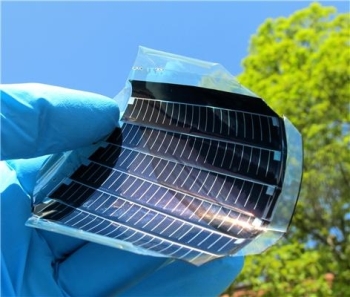A colorless polyimide film, DuPont Kapton, which is being developed for application as a versatile superstrate in thin film PV modules using cadmium telluride (CdTe), has achieved a global record in power conversion efficiency.
 Fully monolithically integrated flexible solar module (consisting of 6 cells) based on cadmium telluride (CdTe)
Fully monolithically integrated flexible solar module (consisting of 6 cells) based on cadmium telluride (CdTe)
The tests performed on the new colorless film by a team of experts at Empa, the Swiss Federal Laboratories for Materials Science and Technology, has showed a conversion efficiency of 13.8%, surpassing the earlier record of 12.6% and almost equivalent to that of glass modules.
The Kapton film is 200 times lighter and 100 times thinner than the glass normally utilized in PV modules and also has a number of advantages over other CdTe systems that use rigid glass. Using polymer film as a substrate enables the deployment of speedy and economical roll-to-roll deposition technologies for increased production of solar cells. The polyimide film enables the manufacture of lightweight and thin flexible solar modules that are low-cost to install and easy to handle. The thin-film modules are suitable for use in building integrated photovoltaics.
The Laboratory of Thin Films and Photovoltaics at Empa is in the process of developing new thin film solar cells with higher level of conversion efficiency. In its efforts to improve the performance of solar cells, the lab is developing device structures for cost-effective and efficient products.